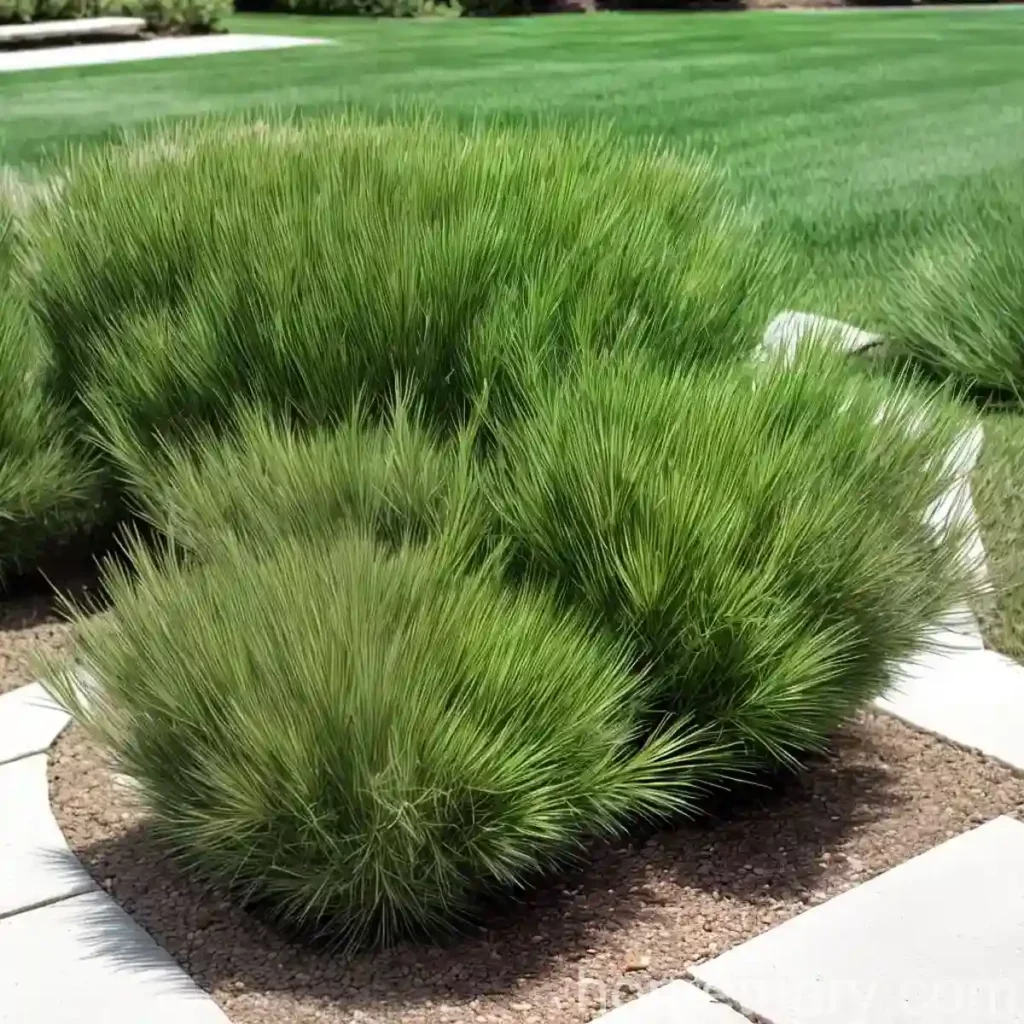Plant Scientist’s Guide to Bermuda Grass (Cynodon dactylon ‘Sundevil’)
What is Plant: Bermuda Grass (Cynodon dactylon ‘Sundevil’)
Bermuda grass (Cynodon dactylon) is a tough, resilient grass species belonging to the genus Cynodon. It is widely recognized for its adaptability, durability, and rapid growth, making it a popular choice for lawns, sports fields, golf courses, and other high-traffic areas. Within the Bermuda grass genus, the ‘Sundevil’ variety (Cynodon dactylon ‘Sundevil’) is particularly renowned for its exceptional characteristics.
Key Takeaways – Bermuda Grass (Cynodon dactylon ‘Sundevil’)
- Bermuda grass is a versatile and resilient grass species with wide applications in various landscapes.
- The ‘Sundevil’ variety of Bermuda grass (Cynodon dactylon ‘Sundevil’) offers specific features that make it popular for specific purposes.
- Understanding the culture, uses, and key care requirements of Bermuda grass is essential for successful cultivation and maintenance.
Culture
Understanding the cultural requirements of Bermuda grass, particularly the ‘Sundevil’ variety, is critical to its successful cultivation and robust growth. Proper cultural practices ensure that the grass thrives and exhibits its desired characteristics.
Uses
Bermuda grass, including the ‘Sundevil’ variety, offers numerous applications due to its adaptability and durability. Some of its common uses include:
- Lawn Grass: Bermuda grass is a popular choice for lawns due to its ability to withstand heavy foot traffic and its rapid regrowth after mowing.
- Sports Fields: Its resilience and quick recovery make Bermuda grass an ideal choice for sports fields that experience frequent use and require rapid turf regeneration.
- Golf Courses: Many golf courses utilize Bermuda grass for its ability to create a dense, uniform playing surface under varying environmental conditions.
- Parks and Landscapes: Bermuda grass is often chosen for public parks and landscape areas due to its robust nature and low maintenance requirements.
Water
Proper water management is crucial for the healthy growth and maintenance of Bermuda grass, including the ‘Sundevil’ variety. Understanding its water requirements aids in preventing issues related to overwatering or underwatering.
- Irrigation: Bermuda grass typically requires regular watering, especially during its active growth periods. It is important to provide deep, infrequent waterings to encourage deep root development and overall plant resilience.
Sunlight
Bermuda grass, including the ‘Sundevil’ variety, exhibits high sunlight requirements and thrives in full sun conditions. Adequate exposure to sunlight is essential for promoting healthy growth and lush turf density.
- Sun Requirements: Bermuda grass varieties, including ‘Sundevil,’ necessitate at least 6-8 hours of direct sunlight daily for optimal growth and vigor.
Fertilizer
Proper fertilization practices are essential for maintaining the health and vigor of Bermuda grass. Understanding the nutritional needs of the ‘Sundevil’ variety and applying appropriate fertilizers at the right times is crucial for optimal growth and sustenance.
- Fertilization Schedule: Bermuda grass typically benefits from regular fertilization during its growing season, with the application of balanced, slow-release fertilizers to promote steady and healthy growth.
Soil
The soil quality and composition play a significant role in the growth and development of Bermuda grass, including the ‘Sundevil’ variety. Understanding the soil preferences and making necessary amendments is essential for successful cultivation.
- Soil Type: Bermuda grass thrives in well-drained, loamy, or sandy soils with good fertility and a slightly acidic to neutral pH range.
Pruning
Regular mowing and maintenance practices are vital for the health and aesthetic appeal of Bermuda grass lawns. Proper mowing encourages lateral growth, dense turf, and overall turf health.
- Mowing Height: Maintaining the correct mowing height is crucial for Bermuda grass. Different varieties, including the ‘Sundevil,’ may have specific height recommendations for optimal growth and performance.
Propagation
Understanding the various methods of propagating Bermuda grass, including the ‘Sundevil’ variety, is essential for establishing new turf or expanding existing grass areas.
- Seeding: Bermuda grass can be propagated by seed, which is an effective method for establishing new turf or overseeding existing lawns to promote denser growth.
- Sodding: Using Bermuda sod is a quick and efficient way to establish a new lawn or rejuvenate an existing one, providing an instant turf cover.
Container Popularity
While Bermuda grass is often established via seeding or sodding, it can also be grown in containers for specific landscape or sports field applications.
- Container Growth: Bermuda grass, including the ‘Sundevil’ variety, can be cultivated in containers, providing versatility in its potential uses and applications.
Common Diseases
Bermuda grass, including the ‘Sundevil’ variety, is susceptible to certain diseases, necessitating proper management and preventative measures.
- Disease Susceptibility: Understanding the common diseases afflicting Bermuda grass and ‘Sundevil’ variety aids in early detection and appropriate treatment.
- Diagnosis and Management: Recognizing the signs and symptoms of diseases in Bermuda grass allows for prompt intervention and effective disease management.
Common Pests
Pest infestations can pose significant challenges to the health and vitality of Bermuda grass. Identifying common pests and implementing control measures is essential for mitigating potential damage.
- Pest Identification: Knowing the common pests that affect Bermuda grass helps in implementing targeted pest control measures for effective management.
Botanist’s Tips
As a plant scientist and botanist, it is essential to consider the following tips for successful and sustainable cultivation of Bermuda grass, particularly the ‘Sundevil’ variety.
- Soil Testing: Conducting soil tests prior to planting Bermuda grass assists in identifying soil deficiencies and determining necessary soil amendments.
- Cultural Practices: Adhering to proper cultural practices, including irrigation, fertilization, and mowing, is vital for maintaining healthy Bermuda grass turf.
- Pest and Disease Monitoring: Regular monitoring for pests and diseases allows for early intervention and effective management, preserving the vigor of Bermuda grass.
- Appropriate Varietal Selection: Selecting the appropriate Bermuda grass variety, such as the ‘Sundevil’ cultivar, based on its specific characteristics and intended use is crucial for successful cultivation.
- Environmental Adaptability: Consider the adaptability and tolerance of Bermuda grass to different environmental conditions, such as drought, shade, and soil types, when planning for its cultivation.
Fun Facts
- Bermuda grass was historically introduced to the United States from Africa and has since become one of the most widely utilized warm-season grass species.
- The ‘Sundevil’ variety of Bermuda grass is renowned for its rapid establishment, dense turf growth, and robust resilience, making it a popular choice for high-traffic areas and sports fields.
Links to External Resources
For further information on Bermuda grass (Cynodon dactylon ‘Sundevil’) and its cultivation, maintenance, and varieties, refer to the following external resources:
- University of California Agriculture & Natural Resources – Bermuda Grass for Lawns
- Clemson Cooperative Extension – Bermudagrass Management
- Texas A&M AgriLife Extension – Bermudagrass Lawn Management Calendar
- The Lawn Institute – Bermudagrass Varieties
- Sports Turf Managers Association – Bermuda Grass for Sports Fields
- University of Florida IFAS Extension – Bermudagrass Diseases
By adhering to proper cultural practices, understanding the specific care requirements, and leveraging the adaptability and resilience of Bermuda grass, including the ‘Sundevil’ variety, plant enthusiasts and landscape professionals can effectively harness the benefits of this versatile and robust grass species. As a plant scientist, it is important to continue exploring and experimenting with the myriad of Bermuda grass varieties and their diverse applications, contributing to the sustainable management and cultivation of this valuable plant species.
This extensive guide to Bermuda grass (Cynodon dactylon ‘Sundevil’) serves as an invaluable resource for plant enthusiasts, landscape professionals, and individuals seeking comprehensive insights into the cultivation, maintenance, and extensive uses of this resilient and versatile grass species.















